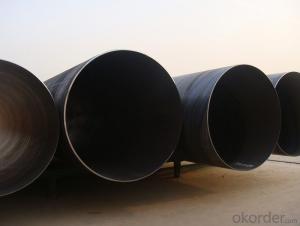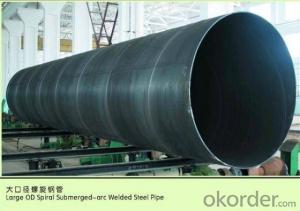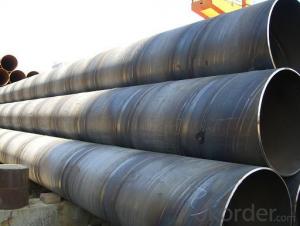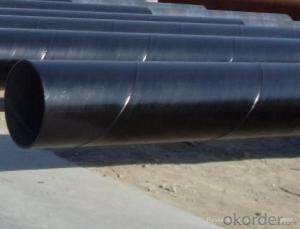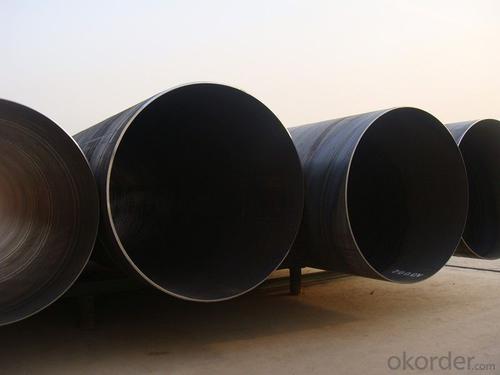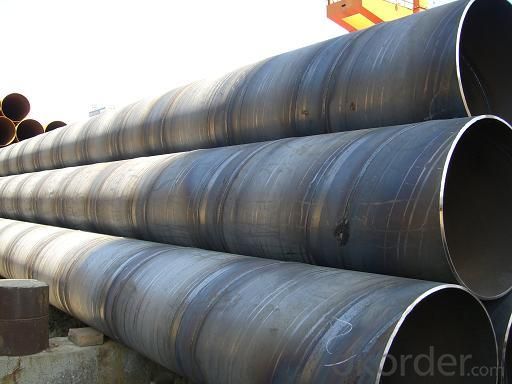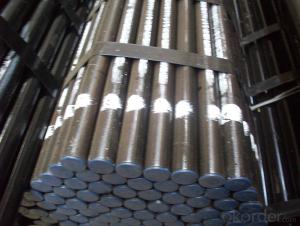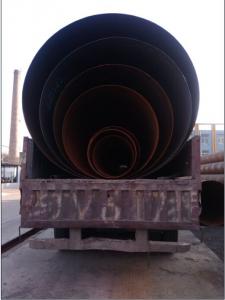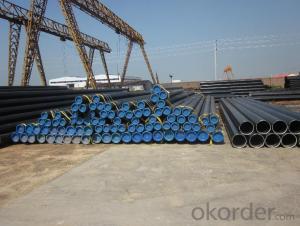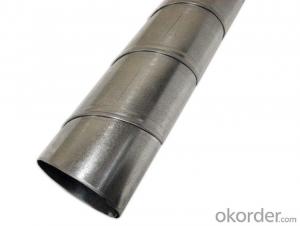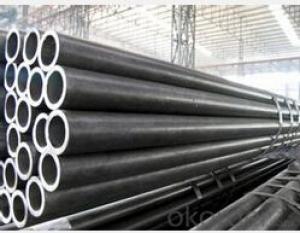SPIRAL CARBON STEEL PIPE ASTM API
- Loading Port:
- China Main Port
- Payment Terms:
- TT OR LC
- Min Order Qty:
- -
- Supply Capability:
- -
OKorder Service Pledge
OKorder Financial Service
You Might Also Like
Packaging & Delivery
Packaging Detail: | standard export packing or as customer's requirement |
Delivery Detail: | within 10 - 30 days |
Specifications
Spiral Welded Steel Pipes and Tubes
1.Material:Q195-Q235
2.Length:1-12m
3.WT:1.0-14mm
4.O.D.:20-273mm
Spiral Welded Steel Pipes and Tubes
Product Description:
1.Material : Q235,Q345,L245,L290,L360,L415,L450,L485,GrB,X42,46,X52,X56,X60,X65,X70,X80,X100
2,Standard: SY/T5037-2000,GB/T9711-2011,API Spec 5L PSL1/PSL2,ASTM A252\A53,ISO3183,DIN17172,EN10217,JIS G3457,AWWA C200,ASTM A139,ASTM A671,ASTM A672
3.Wall thickness: 3.0mm-30mm
4.Outer diameter: φ168mm-3020mm
5,Length: 5m-12m or as your requirement
6,Corrosion protection standard: DIN30670,DIN30671, AWWAC210, AWWA C203, SY/T0413-2002,SY/T0414-2002
7,Application: Oil, gas, natural gas, water pipe, thermal electricity pipe, steel structure engineering, etc
Q195-q345 Material Steel Pipe's Materials
Elements | Chemical Compsition% | Mechanical Property | ||||||
| C% | Mn% | S% | P% | Si% | Yield Point (Mpa) | Tensile Strength(Mpa) | Elongation |
Q195 | 0.06-0.12 | 0.25-0.50 | <0.050 | <0.045 | <0.030 | >195 | 315-430 | 32-33 |
Q215 | 0.09-0.15 | 0.25-0.55 | <0.05 | <0.045 | <0.030 | >215 | 335-450 | 26-31 |
Q235 | 0.12-0.20 | 0.30-0.70 | <0.045 | <0.045 | <0.030 | >235 | 375-500 | 24-26 |
Q345 | <0.20 | 1.0-1.6 | <0.040 | <0.040 | <0.55 | >345 | 470-630 | 21-22 |
- Q: How are steel pipes used in the manufacturing of wastewater treatment systems?
- Steel pipes are commonly used in the manufacturing of wastewater treatment systems as they provide a durable and corrosion-resistant material for transporting and distributing water and chemicals within the system. They are used for various purposes such as conveying wastewater, carrying treated water to different stages of the treatment process, and transferring chemicals for disinfection or filtration. Additionally, steel pipes are often used for constructing the framework and support structures of wastewater treatment systems due to their strength and versatility.
- Q: Can steel pipes be used for oil and gas well production?
- Yes, steel pipes are commonly used for oil and gas well production due to their high strength, durability, and resistance to corrosion.
- Q: What is the average lifespan of a steel pipe?
- The average lifespan of a steel pipe can vary depending on various factors such as the quality of the steel, the environment it is exposed to, and the level of maintenance. However, with proper installation and maintenance, a steel pipe can typically last anywhere from 20 to 100 years.
- Q: How are steel pipes used in the power generation sector?
- Steel pipes are widely used in the power generation sector for various purposes. They are primarily used for transporting fluids, such as water, steam, and oil, as well as gases, in power plants. Steel pipes are also used for constructing pipelines that carry fuel, like natural gas or coal, to power plants. Additionally, they are used for structural purposes, supporting equipment, and maintaining the overall integrity of power generation facilities.
- Q: What are the factors to consider when selecting steel pipes for a specific application?
- When selecting steel pipes for a specific application, there are several factors to consider. The first is the type of steel needed, which can vary based on factors such as the desired strength, corrosion resistance, and temperature resistance. Secondly, the size and dimensions of the pipes should be evaluated to ensure they meet the requirements of the application. Additionally, the specific application's operating conditions, such as pressure, temperature, and environment, should be taken into account. The manufacturing process and quality standards of the steel pipes, as well as the supplier's reputation and reliability, should also be considered. Lastly, cost-effectiveness and budget constraints are essential factors to keep in mind when selecting steel pipes for a specific application.
- Q: Can steel pipes be used for gas transportation?
- Yes, steel pipes can be used for gas transportation. Steel pipes are commonly used for the transportation of natural gas, propane, and other gases due to their high strength, durability, and resistance to corrosion. They can effectively withstand high pressure and extreme temperatures, making them a reliable choice for gas transportation systems.
- Q: What are the different grades of steel used for pipes?
- Pipes are manufactured using various grades of steel, each possessing unique properties and applications. Some commonly utilized grades include: 1. Carbon Steel: This type of steel is widely employed in pipe manufacturing, particularly for low-pressure purposes. It contains a low carbon content, typically less than 0.30%, facilitating easy welding and forming. Carbon steel pipes are known for their durability and cost-effectiveness, making them suitable for diverse industries. 2. Stainless Steel: Stainless steel pipes are renowned for their corrosion resistance and high strength. They consist of an alloy of iron and chromium, with additional elements like nickel and molybdenum enhancing their properties. These pipes find extensive usage in industries such as chemical processing, food production, and oil and gas, where corrosion resistance is vital. 3. Alloy Steel: Alloy steel pipes are created by incorporating elements like manganese, chromium, or nickel into carbon steel. This enhances their strength, hardness, and wear resistance, rendering them appropriate for high-pressure and high-temperature applications. Industries such as power generation, petrochemical, and aerospace frequently employ alloy steel pipes. 4. Duplex Steel: Duplex steel represents a type of stainless steel that combines austenite and ferrite phases. This results in a material possessing exceptional strength, corrosion resistance, and toughness. Duplex steel pipes are commonly utilized in offshore oil and gas platforms, as well as in chemical and petrochemical industries. 5. Low-Temperature Steel: Low-temperature steel is specifically designed to withstand extremely cold temperatures without becoming brittle. These pipes find significant use in industries such as cryogenic storage, LNG transportation, and refrigeration. Choosing the appropriate grade of steel is crucial to ensure optimal pipe performance and longevity. Factors such as temperature, pressure, corrosion resistance, and cost should be taken into account when selecting the steel grade for pipes.
- Q: How are steel pipes coated to prevent internal corrosion?
- Steel pipes are coated to prevent internal corrosion through a process called internal coating. This involves applying a protective layer of epoxy or polyethylene coating on the inner surface of the pipes. This coating acts as a barrier between the steel surface and the fluid being transported, preventing the corrosive elements from coming into direct contact with the steel and reducing the risk of internal corrosion.
- Q: How does galvanization protect steel pipes from corrosion?
- Galvanization protects steel pipes from corrosion by applying a protective zinc coating on the surface of the pipes. This zinc coating acts as a sacrificial anode, meaning it corrodes first before the steel, effectively preventing rust and corrosion from reaching the underlying steel.
- Q: Are steel pipes suitable for potable water systems?
- Indeed, steel pipes prove to be an appropriate choice for potable water systems. Due to their robustness, longevity, and ability to resist corrosion, they are frequently employed in such systems. These pipes can endure substantial pressure and transport significant quantities of water. Furthermore, their versatility is evident as they can be effortlessly welded together, rendering them suitable for a wide range of applications within potable water systems. Nevertheless, it is crucial to emphasize the importance of regular inspections and adequate maintenance to avert potential problems such as rust or contamination.
Send your message to us
SPIRAL CARBON STEEL PIPE ASTM API
- Loading Port:
- China Main Port
- Payment Terms:
- TT OR LC
- Min Order Qty:
- -
- Supply Capability:
- -
OKorder Service Pledge
OKorder Financial Service
Similar products
Hot products
Hot Searches
Related keywords
